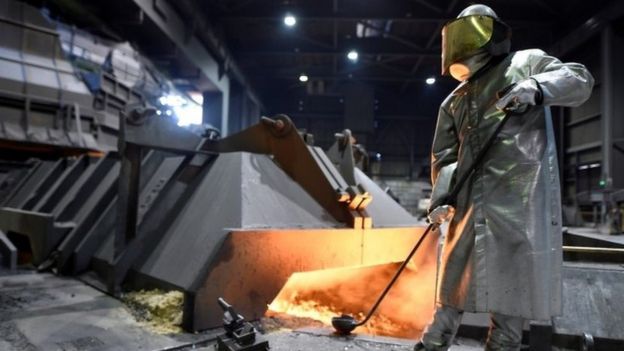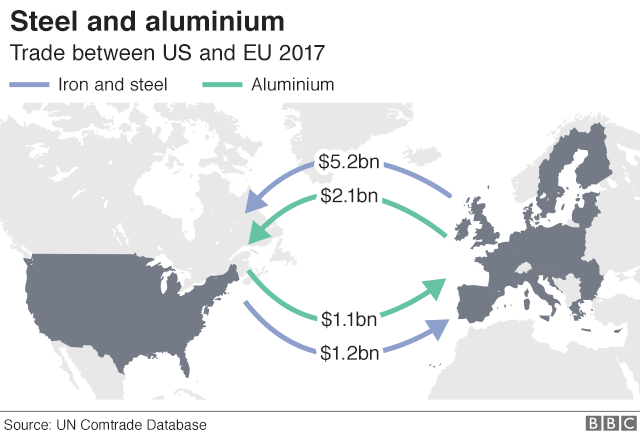US tariffs a dangerous game, says EU
The US is playing a "dangerous game" by slapping tariffs on European steel and aluminium, the European Union's trade commissioner has said.
Cecilia Malmstrom warned the move by US President Donald Trump would have consequences for the economic recovery of the EU, as well as US consumers.
The EU has issued a 10-page list of tariffs on US goods ranging from Harley-Davidson motorcycles to bourbon.
Canada and Mexico are also planning retaliatory moves against the tariffs.
Ms Malmstrom said the EU would challenge the move at the World Trade Organization (WTO) but that tariffs on US imports were necessary as "we cannot just take these tariffs and stay silent".
The commissioner said that despite the EU's "rebalancing" action, the two sides were not in a trade war.
"What we are in is a very difficult situation," Ms Malmstrom said. This situation could only be defused by the US withdrawing its measures against the EU, she added.
- UK labels US metal tariffs 'absurd'
- 'Stand up to bully Trump', says Labour
- US tariffs: Tata Steel calls for 'protection measures'
- Five reasons why trade wars aren't easy to win
Mr Trump claimed the tariffs would protect US steelmakers, which were vital to national security. He has also complained about barriers US firms face in Europe and elsewhere.
Following Ms Malmstroms's speech, he repeated his call for "fair trade".
"We're going to have it for our workers and for our companies and you know what? The other side understands this," he said.
Mr Trump said the US economy is strong enough to handle the consequences of the tariffs and retaliation and dismissed concerns about alienating diplomatic allies.
"They're our allies but they take advantage of us economically," he said.
French President Emmanuel Macron called Mr Trump to tell him the tariffs were "illegal". Mr Trump told Mr Macron there was a need for the US to "rebalance trade" with the EU.
UK International Trade Secretary Liam Fox said the 25% levy on steel was "patently absurd", adding: "It would be a great pity if we ended up in a tit-for-tat trade dispute with our closest allies."
Gareth Stace, head of trade body UK Steel, said the tariffs were "no way to treat your friend" and called on the government to safeguard the industry's 31,000 jobs.
Justin Trudeau, the Canadian Prime Minister, said the US move was "totally unacceptable" and rejected the claim that his country posed a national security threat to America.
Canada plans to impose tariffs of up to 25% on about $13bn worth of US exports from 1 July. Goods affected will include some American steel, as well as consumer products such as yoghurt, whiskey and coffee.
Opposition to the US tariffs was also voiced by prominent Republicans. House Speaker Paul Ryan, the most influential Republican in Congress, said the move "targets America's allies when we should be working with them to address the unfair trading practices of countries like China".
What do the US tariffs mean?

Mr Trump first announced plans for the tariffs in March, but granted some exemptions while countries negotiated.
On Thursday, US Commerce Secretary Wilbur Ross said talks with the EU, Canada and Mexico had not made enough progress to warrant a further reprieve, meaning tariffs of 25% on steel and 10% on aluminium have now come into effect.
They apply to items such as plated steel, slabs, coil, rolls of aluminium and tubes - raw materials that are used extensively across US manufacturing, construction and the oil industry.
- Allies retaliate with levies on jam, lamps and sleeping bags
- Four reasons Trump is hanging tough on trade
Mr Ross said the president could lift the tariffs or alter them at any time: "We continue to be quite willing and indeed eager to have discussions with all those parties."
On 18 May, the EU told the WTO it planned to impose counter measures affecting goods worth almost €3bn. If approved by the 28 member states, the sanctions will come into effect in mid-June.
What will the economic effect be?

Canada, Mexico and the EU together exported $23bn (£17bn) worth of steel and aluminium to the US in 2017 - nearly half of the $48bn of total steel and aluminium imports last year.
European firms have said they fear lower US demand for foreign steel will divert shipments to Europe.
Analysts at IHS Markit expect the effects to be distributed across a wide range of markets, limiting the effect on steel prices outside the US.
That leaves America to bear the brunt of the economic impact, which economists say will appear in the form of higher prices and job losses - as many as 470,000 by one estimate.
Steel prices in the US have already risen due to the uncertainty and may increase as the tariffs hit imports.
Consumers outside the US could see prices of some goods fall, while those in America may end up paying more.
Comments
Post a Comment